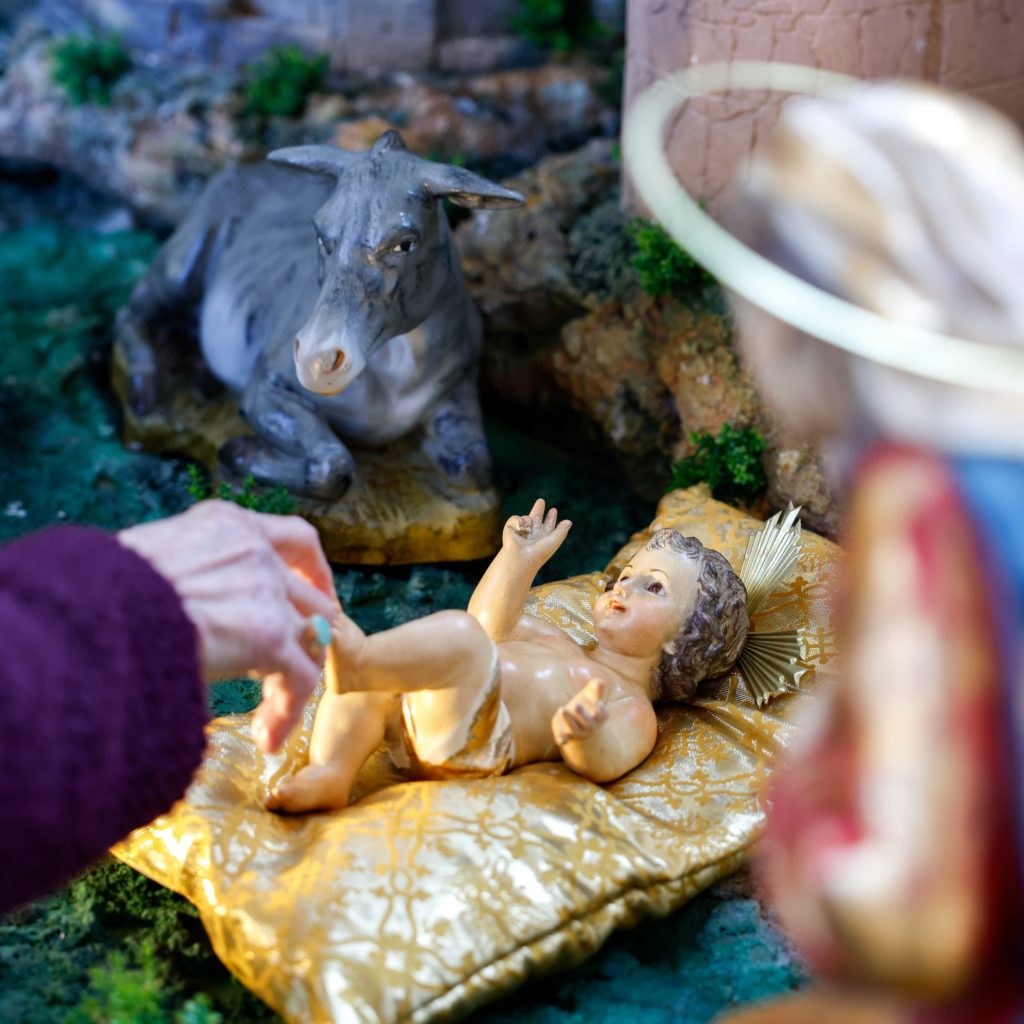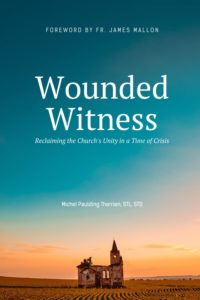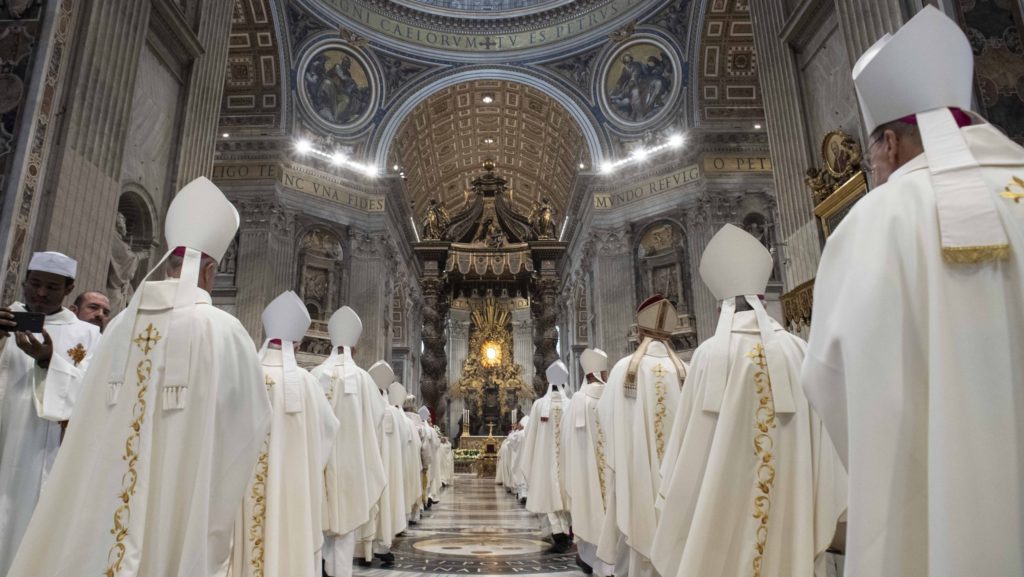I recently spoke at a small gathering that presented the four primary documents of the Second Vatican Council. During the question-and-answer session, a woman spent several minutes expressing her deep grievances about Pope Francis, the Second Vatican Council, and the post-Conciliar Eucharistic liturgy known as the “Novus Ordo.”
Nothing in what she said was unfamiliar to me. What was striking, however, was how laden she was with fear, but also anger, speaking as though she thinks Jesus has lost control of the Church. Where, I thought to myself, is her faith in Jesus’ promises and Lordship?
St. Paul tells us in his Letter to the Colossians, “For it was the Father’s good pleasure for all the fullness to dwell in Him, and through Him to reconcile all things to Himself, having made peace through the blood of His cross (vv. 19–20).”
Christmas reminds us of that great mystery of reconciliation and peace entering history. But peace on earth is only possible through the unity of hearts in love.

Even if we were, by some miracle, to all be of the same mind, it wouldn’t be enough. Unity requires a single focal point — which for God is the human heart of his Son, Jesus. The blue and red rays emanating from the Divine Mercy image proceed from Jesus’ heart, not his eyes. That’s because the unity of mind comes through the unity of love, and not the other way around.
Never in my lifetime have I seen Americans so polarized. At the same time, it’s telling that in this present moment of the Church, we are divided over the essential means of our communion.
It reminds me of what Paul observed in Corinth, when he wished that Christians there “all agree and that there be no divisions among you, but that you be made complete in the same mind and in the same judgment. For I have been informed concerning you . . . that there are quarrels among you (1 Corinthians 1:10–11).” Judging minds will simply quarrel and politicize if they are not united in charity.
Although the woman at that gathering was merely repeating things she had heard from her sources, it was evident to me that a deep anxiety and catastrophizing mindset drove her to a set of rather disparaging conclusions. Her mind was made up, and yet she was so divided within her own heart over all of it.
The single greatest motive of credibility for the Faith, besides miracles, is the unity that appears among Jesus’ disciples, which is truly the greatest miracle of all. Ecclesial division is an ancient problem, and it’s still a challenge today. This explains why Jesus put so much attention on unity at the Last Supper.
Today, the challenge manifests itself in tribalism, especially in the competing theological paradigms that have beset the Church since Vatican II. So how can we reconcile our differences?
I believe it starts with fidelity to that little child in the manger, returning to the source of our reconciliation and peace. These paradigms have conditioned our responses to one another and have closed our ear to the legitimate concerns that different groups and theological generations have raised over the decades since Vatican II.
That’s more or less the topic of my recent book, “Wounded Witness: Reclaiming the Church’s Unity in a Time of Crisis”, which looks at those competing paradigms through which we have become a divided Church. In it, I tell the story of how I believe these divisions came about and how they can be resolved.
In Jesus’ high priestly prayer, he reveals that the world will listen to his followers only insofar as we share in the unity of his love with the Father (John 17:20–22). The mission that follows his prayer is simple: If we are one in the love of God, then the world will see that love and be drawn to our unity. It’s a simple chain of causality. This is why he gives us the “new” commandment to love one another “as” he has loved us. The “how” of Christ’s love makes all the difference in the world, however.
That is why at Christmas we are reminded by the Christ child to lay aside condemnation in favor of the love that does not incriminate, size up or keep score, but communicates the generosity of the Father’s mercy into the world. Human division is the norm — so we must be the exception, without exception. But we aren’t, which is a tragedy for which we do not repent enough. Sadly, the Church is a wounded witness today because we have been caught up in our own version of identity politics. Ecclesial brand identities polarize us along ideological lines and create a scandalous contention within the heart of Christ’s body.

By telling us not to judge one another, Jesus teaches that we are never permitted to ascribe motives or culpability (Matthew 7:1–5). While we must always judge the objective character of our actions, we may never condemn another in our hearts or assess their motives unless it is in our official capacity to do so. To judge in this manner leads down the path of suspicion and incrimination where “the other” or “those people” are seen only to be conspiring against us and our beliefs. Nothing is more unbecoming of Jesus’ disciples than conspiracy theories that attempt to describe events by ascribing hidden motives, especially when these are leveled at the pope, our bishops, or an ecumenical council.
Instead, Jesus instructs us to remove the log from our own eye, so that we can see how best to remove the splinter from our neighbor’s eye. The unity of love is born of humility and self-awareness. We will love our brothers and sisters only to the degree to which we become little in our own estimation, and poor in Spirit — as the Lord says of himself, meek and humble of heart (Matthew 11:29). That kind of unity of love was born in a manger, after all.
That’s why this new year is a perfect time to renew our commitment to the witness of our unity. We all have blind spots. Our own biases often filter our understanding of what matters most to God, like lenses that condition our optics and perceptions of people and their motives. We easily forget that the measure with which we measure, in the words of Christ himself, will be measured out to us.
As Catholics, we are often prone to construct narratives that justify our fears and lead us to assume the worst of one another, whether they are about the Church leaders, the reforms of Vatican II, or the liturgy. Whatever the narrative, and in whatever ways we believe they justify the polemics, they must all be purified by the story we tell at Christmas: that God reconciled all things through Jesus and brought peace through his birth in a manger under the adoring gaze of angels and the humble shepherds who had simply been minding their own flocks.

